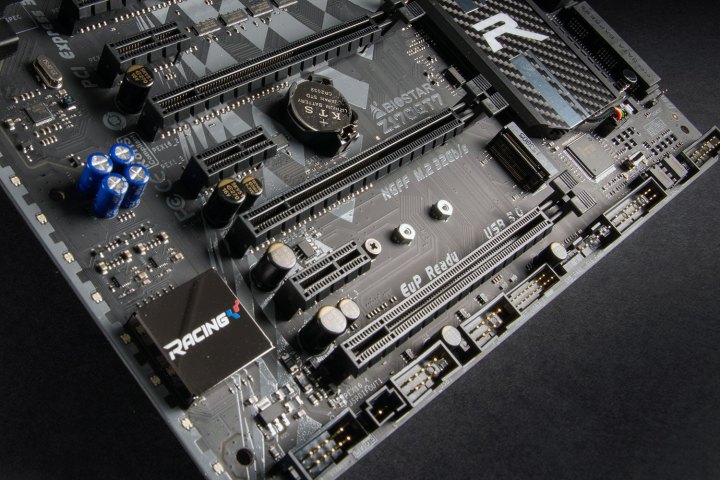PCIexpress (PCIe) is one of the most important technologies on modern motherboards, helping to get the most from the fastest SSDs to the most powerful graphics cards.
But depending on which board you buy, you may have support for the latest generation of PCIe 4, which has some notable advantages over its predecessor, PCIe 3. Here’s what you need to know about the next generation of PCIe.
Availability
PCIe 3 has been available on a huge swathe of different motherboards since 2010, and continues to be the most populous PCIe port available in 2020. It’s found on 300 and 400-series motherboards for AMD’s first and second generation Ryzen CPUs, as well as on Intel 300-series boards used for its 8th and 9th-gen processors. It’s also found on most boards released over a few years before these chip generations.
PCIe 4 made its debut with AMD’s third-generation Ryzen processors on its 500-series motherboards, specifically with the x570 chipset. As of early 2020, the only motherboards that support PCIe 4 are based on the AMD x570 chipset.
Intel hasn’t made any official commitment to PCIe 4 support on compatible motherboards, though it has released its own PCIe 4 SSDs. Some rumors pointed to Intel debuting PCIe 4 with its 10th-generation Comet Lake CPUs, but that due to problems implementing it, Intel had to nix the feature, according to Toms Hardware. Meanwhile, our own reporting has revealed internal documents that confirm that Intel’s new Xe graphics cards will use PCIe 4.
Motherboards may still technically support it, though, so it may be that when the next-next-generation Rocket Lake CPUs debut in 2021, that existing Comet Lake boards could gain the feature with a chip upgrade.
Other speculation says that Intel may skip PCIe 4 altogether and instead push for the recently standardized PCIe 5 with future CPU generations.
Speed

The greatest advantage of PCIe 4 over PCIe 3 is in its speed — or overall bandwidth. Like generations of PCIe before it, PCIe 4 doubles its bandwidth over the last-generation, increasing the per-lane bandwidth to 2 gigabytes per second (2GBps). With options for 1x, 2x, 4x, 8x, and 16x slots, that increases the maximum potential bandwidth for a PCIe 4 slot to 64GBps.
This gives anything that plugs into a PCIe slot more headroom, but for the most powerful of graphics cards, that’s not really needed just yet. The 2080 Ti, the most powerful mainstream graphics card ever made, doesn’t come close to saturating an x16 PCIe 3 slot, only seeing some bottlenecking on PCIe 3 x8 slots, as TechPowerUp proved in its 2018 testing.
Where this additional bandwidth can be taken advantage of in full is with other kinds of add-in cards. Most namely, storage. Multiple PCIexpress 4.0 NVMe drives can operate in RAID 0 configuration to offer sequential read/write speeds of up to 15GBps.
Extra lanes and compatibility
With little real-world tasks that can take advantage of the full bandwidth of PCIe 4 x16 slots, the major advantage of it, at least in the near future, will be in the reduction in lane requirements for devices and add-in cards. Instead of a 10 Gigabit network card requiring multiple PCIe 3 lanes, it can get away with just a 1x slot. Graphics cards can operate at PCIe 4 x8 speeds, enjoying the same bandwidth as PCIe 3 x16 slots, but with half the lanes used.
Those additional lanes can be freed up for additional devices in larger builds, or allow for faster devices to operate on smaller PCIe slots for more compact systems.
Supporting boards aren’t limited to PCIe 4 devices either. PCIe 4 slots are entirely backwards compatible, meaning that any older-generation PCIe devices, whether it’s first, second, or third generation, will work just fine with PCIe 4.
Editors' Recommendations
- IPS vs. VA displays: Which is best for your monitor or TV?
- GPT-4 vs. GPT-3.5: how much difference is there?
- Windows 11 vs. Windows 10: finally time to upgrade?
- Dell vs. HP: Which laptop brand is best for your needs?
- Nvidia is bringing ray tracing and DLSS 3 to your car




